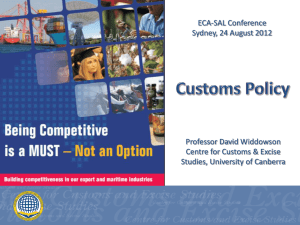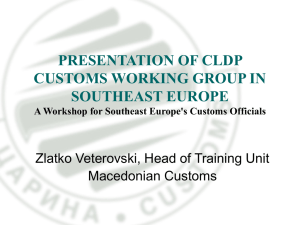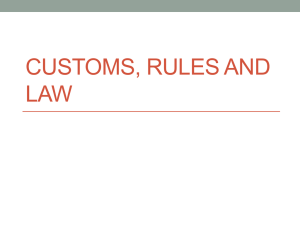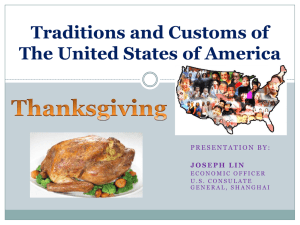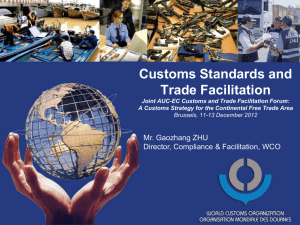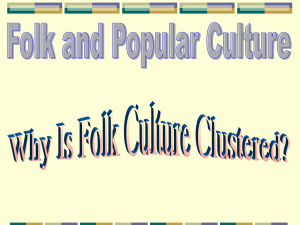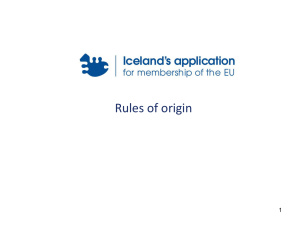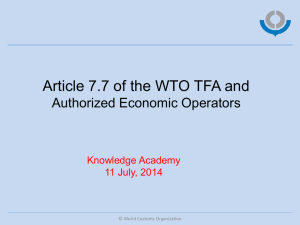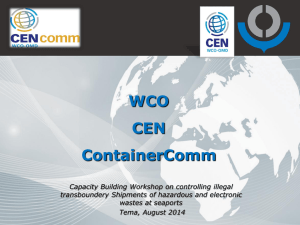International Customs - Co-operation and Mutual
advertisement
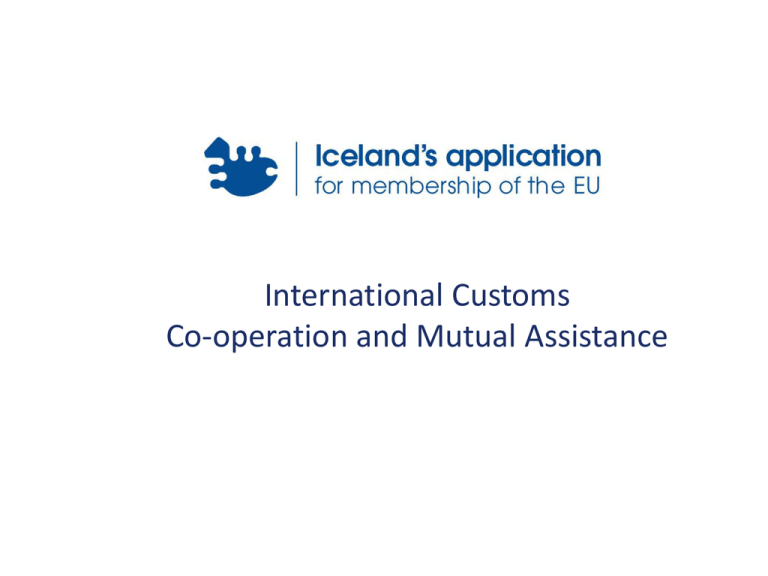
International Customs Co-operation and Mutual Assistance Contents: 1. International Conventions 2. International Customs Cooperation 3. Mutual Assistance 4. Gap Analysis 1. International Conventions The Republic of Iceland is a member of the: •United Nations •World Customs Organization •World Trade Organization •European Economic Area •Schengen Agreement •NATO •European Free Trade Association •OECD •Nordic Council 1. International Conventions The Republic of Iceland is, i.a., signatory to the following International Conventions: •Convention on the Harmonized Commodity Description and Coding System (1988) •SAD Transit Convention (1988) •General Agreement on Tariffs and Trade (GATT) (1968) •Istanbul Convention (1990?) •Full list of Conventions – customs related and otherwise - available on M of Foreign Affairs website: http://www.utanrikisraduneyti.is/samningar/ 1. International Conventions Alignment: Conventions/agreements ratified and transposed into national legislation 2. International Customs Cooperation Legal Basis: Customs Act No 88/2005 – article 40, point 11 stipulates that one of the roles of the Directorate of Customs is : “Participation in international cooperation of customs authorities.” 2. International Customs Cooperation Pillars of Iceland´s International Customs Cooperation: •Nordic Cooperation and Networks •EFTA Committees and Free Trade Agreements •EEA Agreement– bilateral agreements etc •WCO Instruments and Networks 2. International Customs CooperationNordic Countries Agreement between the Nordic Countries regarding mutual assistance in customs matters (1981) Various Nordic cooperation fora, i.e. •Nordic Customs Administrative Council (NTR) •PTN (Nordic Police and Customs) • NLO (Nordic officers stationed around the world) 2. International Customs CooperationEFTA Iceland a member of EFTA since 1970 EFTA FTA´s with the following third countries: Albania, Canada, Chile, Colombia, Croatia, Egypt, Gulf Cooperation Council (GCC), Israel, Jordan, Republic of Korea, Lebanon, Macedonia, Mexico, Morocco, Palestinian Authority, Peru, Serbia, Singapore, Southern African Customs Union (SACU), Tunisia, Turkey, Ukraine Participation in working groups and committees related to customs and transit issues 2. International Customs CooperationEuropean Union Iceland a member of the EEA (1994) which enables participation in the EU´s Internal Market Legal basis for customs cooperation and mutual assistance: •Chapter 3, Articles 21-22 of the EEA Agreement and • Protocol 11 to the EEA Agreement Mutual Assistance Agreements with EU member states – •Germany (1978) •Poland (1980) •Nordic States (1982) 2. International Customs CooperationWCO Iceland a signatory to the Convention Establishing the Customs Cooperation Council Member Country of the WCO •Participation in joint initiatives spearheaded by the WCO •Cooperation on bi- and multilateral level with other MA´s •Representation in: • Council Session, • Enforcement Committee, • Capacity Building Committee •Participation in various fora which have relevance at particular times 2. International Customs CooperationSpecific Examples OLAF Participation in various networks and special projects 2. International Customs Cooperation Scope of Agreements Ensure correct application of customs legislation; assistance in customs matters; customs cooperation; etc etc Type of Assistance On request Spontaneous 2. International Customs Cooperation Types of Assistance Exchange of information and documents Surveillance of persons, goods, places and means of transport Delivery of Documents or notification of decisions 4. Gap Analysis •TIR Convention •Convention on the Harmonization of Frontier Controls of Goods •Revised Kyoto Convention (ratification process underway – will be finished in 2011) •Coordination Unit for handling requests (as pr Article 5 of Naples II Convention) Thank you for your attention!

